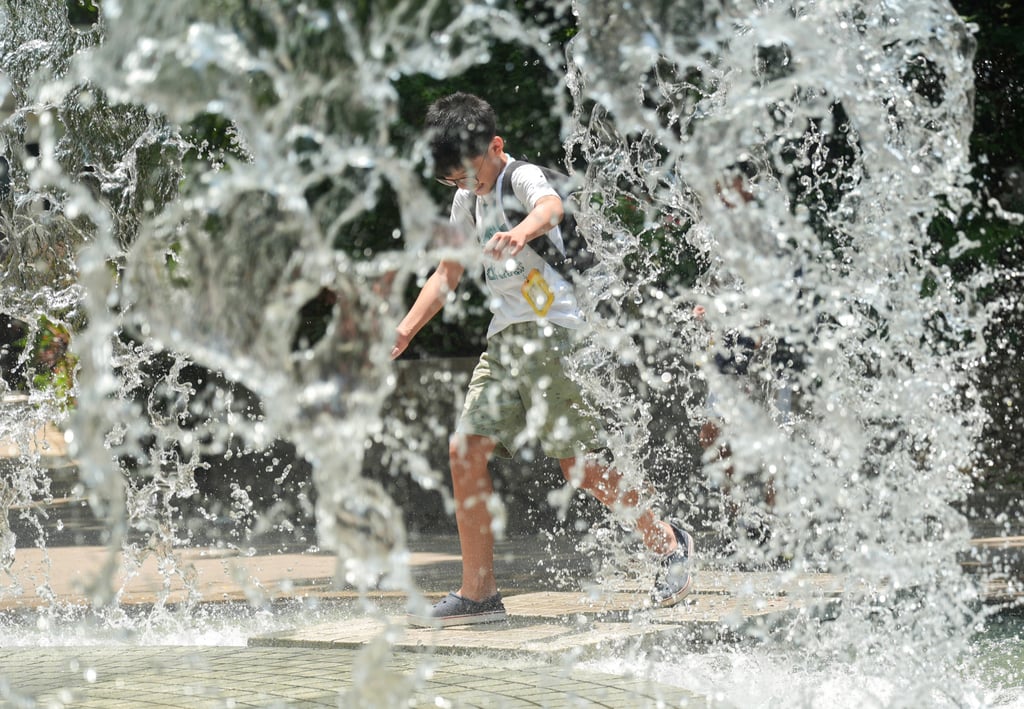Calls to charity for elderly hit 1,620 a day as Hong Kong logs record heat high on Monday
The Society for Community Organisation (SoCO) added that care teams should also be sent to visit high-risk groups.
The Observatory confirmed it had recorded a maximum temperature of 35.4 degrees on Monday and that it was “the highest temperature recorded this year”.
Scientific officer Wong Yat-chun said the soaring temperatures were down to light winds caused by a weather system over southern mainland China.
The Observatory explained that an anticyclone, associated with calm, fine weather, over the area had triggered the heat.
Tuesday is expected to be cloudy with a few showers, but there will be no let-up in the temperatures over the next couple of days.
The “very hot weather warning” issued by the Observatory has been in force since 1.20pm on August 1 – more than 50 hours at 6pm on Monday.
Hong Kong’s hottest day of 2024 came two weeks after the world notched up a record. The hottest day since records began was logged on July 22, when the global surface air temperature reached 17.15 degrees.
Wong warned the public, especially the elderly, to drink more water and protect themselves against exposure to the heat.

The maximum temperature in nine districts reached at least 37 degrees on Monday evening, with Sheung Shui topping the list at 38.9 degrees. It was followed by 38.1 degrees in Tai Lung and Yuen Long Park, while Shek Kong recorded 37.7 degrees.
The nine areas most affected were Happy Valley, Sheung Shui, Ta Kwu Ling, Tai Lung, Tai Po, Yuen Long Park, Lau Fau Shan, Shek Kong and Wetland Park.
A Post reporter compared the temperatures in a variety of areas on consecutive days and found that Sheung Shui had reached more than 37 degrees every day since Saturday.
Observatory figures showed the number of very hot weather warnings issued each year had increased from 31 in 2014 to 42 last year.
The Post reported earlier that Hong Kong heatwaves over the past 10 years may have contributed to more than 1,600 excess deaths.
A research team from the University of Hong Kong (HKU) said each heatwave had caused an extra 93 deaths compared with normal conditions.
The team found the city had experienced more days of extreme heat, with a mean temperature of 30.6 degrees or higher, over recent years.
There were just six in 2014 and 29 in 2022 and the researchers appealed to the government to draw up an extreme weather action plan to cut health risks.

Gloria Siu Wai-lin, head of the association’s care-on-call centre, said staff had seen a surge in the number of calls from the elderly over the past few days, which she attributed to the increased temperatures.
“If the elderly feel unwell, they may not be able to say they are unwell due to heatstroke,” she warned.
“Many will report dizziness, discomfort across the body or nausea. We know these symptoms are possibly related to the heat.”
The hotline service has fielded an average of 1,620 calls a day since the start of August, a four per cent daily increase compared with July.
Siu said many callers were elderly people who lived alone.
She said the association would call an ambulance for the most serious cases and refer people with moderate problems to government clinics for advice and help.
Siu warned of a further increase in calls as the elderly often delayed asking for assistance.
“[The elderly] may not press the button for our services at once when they feel sick,” Sui explained.
“For instance, if they feel uncomfortable from the heat today, they may wait for a while more before calling.”
But she told the elderly to get help as soon as they started to feel unwell, rather than suffer in silence until their condition worsened.
Ivan Lin Wai-kiu, a SoCO community organiser, said subdivided home tenants had complained about the heat throughout the summer and that the government should offer energy subsidies to those in need.
He added social security assistance did not cover air conditioners, which had become a necessity.
Lin said the authorities should send out community care teams to visit high risk groups during extreme hot spells.
“Some of the subdivided tenants do not have windows in their units or cannot open their windows due to rat infestation,” he said.
He added that they might refuse to turn on air conditioning to cut expenditure on electricity and spend their days in public places where the temperature was controlled.
“The heat may also affect their mental health as some of them cannot sleep,” Lin added. “They may have some skin problems too.”
Additional reporting by Jess Ma and Sammy Heung